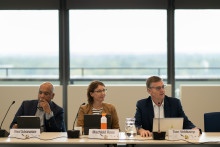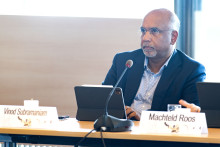The University Council hopes, above all, that the extra funds will benefit ‘increasing individual support for students by employing more student advisers and tutors.’
In addition, the council recommends increasing the teaching capacity by hiring PhD students for a period of six years, thus increasing their contribution to education - both quantitatively and qualitatively. A BKO should be part of such a trajectory. Both the candidate and the permanent academic staff would benefit from this recommendation. Some of these appointments have already been made, but according to the Council, the number should be increased. It should also be investigated whether the current four-year contracts can be converted into six-year appointments. And if possible: employ graduates immediately after completing their masters or PhDs.
Dick Meijer (PvdUT) explained this recommendation, referring to the successful pilot within the EEMCS faculty. Mirjam Bult indicated that 'everyone agrees that these are good ideas', but did add some nuance. ‘A temporary contract need not always be the result of policy, but can also be the preference of a PhD student. You always have to keep that difference in mind. The conversion of appointments from four years to six years is now taking place within EEMCS. I would rather evaluate that process, before we start taking it up UT-wide.'.
Besides the recommendations for the faculties, the Council also came up with two broader recommendations. For instance, it advocates expanding the number of staff. ‘This can be done by transferring temporary positions to permanent ones and by offering new, talented staff the prospect of a permanent position. In addition, the Council wants to use overlapping positions to replace staff who retire within five years. 'There is a temporary budget available, it increases capacity, reduces the average workload and improves the continuity of work,' the Council argued.
According to the Council, a balanced package of measures must ultimately become part of a new staff policy. Attention to diversity is part of this, including the pursuit of a percentage of female appointments.






